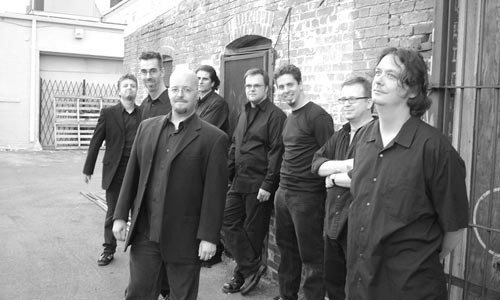Beginning early this century, the second wave of post-rock became huge in the underground scene, as kids flocked to bands such as Explosions in the Sky, Mono and Russian Circles. Yet very few know that one of the seminal groups in the instrumental rock movement had its roots right here. And no, I'm not talking about Don Caballero.
Norman Veenstra was a DJ at Carnegie Mellon's WRCT-FM and organized concerts for two years as one of Pittsburgh's earliest indie-rock promoters. So when he left for Washington, D.C., in 1991 to manage the 9:30 Club (a job he kept for more than a decade) and discussed forming a band with venue employee Gregg Hudson, Veenstra was already under the sway of the music he had unearthed as a CMU student.
"Norm and I clicked when it came to music," Hudson recalls. "It could be Swans or Glenn Branca -- we just liked a big, loud sound. We weren't looking to do verse-chorus-verse-solo-bridge stuff [...] eventually others were brought in who shared a similar interest and didn't mind being in a band without vocals."
Tone burst on the scene in 1994 with the Build EP, released as a split between Dischord Records and the Independent Project label (owned by Bruce Licher of Los Angeles post-punkers Savage Republic). At one point, Tone boasted ex-members of D.C. punk legends Teen Idles and Government Issue. Some of them had become friends with Richmond's Kranky Records droners Labradford, and through that relationship discovered that the post-rock zeitgeist had also spread to places like Montreal.
"Labradford were the support for Godspeed [You Black Emperor] on their first tour, and we managed to get the support slot," Veenstra recalls. "Seeing Godspeed showed how far you can take [instrumental rock] in terms of incredible instrumentation and longer songs. To me, it was like a connection with brethren I had never met before. Also around that time, Mogwai was borrowing from Slint and math rock, and they talked about hating singers. I heard it, and I agreed with them."
Though Tone had always regarded itself as a Branca-styled "guitar ensemble," as opposed to a mere rock band, cultural affirmation came from a different discipline. While the band was recording Solidarity with J. Robbins of Jawbox (released in 2006 on Neurot Records), it was invited to provide the soundtrack for the D.C-based dance company of choreographer Lucy Bowen McCauley. "It came about when Norm and I were doing an interview for [public radio station] WETA, which was overheard by her husband," says Hudson. "In some instances, she would ask us to do some editing, so it literally became a 'dance remix' of our music."
The latest configuration of Tone contains four guitarists, a bassist and two drummers, returning them to a denser version of their initial concept. But how easy is it to keep a group together that boasts seven members, mostly engaged or married, with five kids between them? Not very, according to Hudson.
"I have a 2-year-old daughter myself, and these guys have careers that they take seriously. We're in a phase right now where it's hard to get everyone to show up to practice at the same time," Hudson says. "If you go to a Tone concert, you're damn lucky if you see the whole band." So be thankful that all the stars are aligned in Pittsburgh this Sun., March 2, when Tone plays CMU.
Tone with Knotfeeder. 7 p.m. Sun., March 2. Rangos Hall, University Center, CMU campus, Oakland. $5. All ages. 412-268-2107













